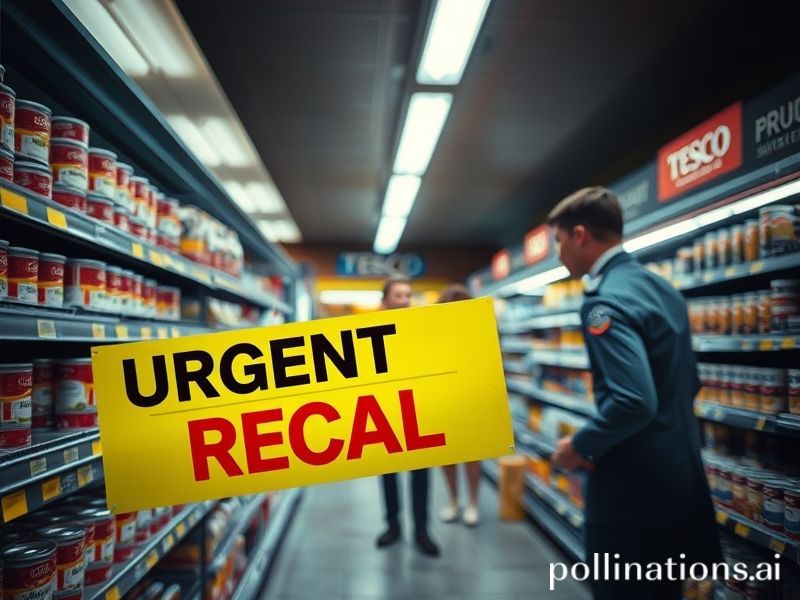tesco product recall
Tesco’s Plastic Fork Recall: A Global Fork-Up in the Age of Infinite Choice
Dave’s Locker – International Desk, 23 April 2024
Somewhere between the war in Ukraine, a crypto-exchange implosion, and the latest TikTok of a cat playing the xylophone, Britain’s biggest grocer has decided to upend the planet’s cutlery supply by recalling 400,000 plastic forks. Tesco, that cheerful arbiter of suburban aspiration, has discovered—after selling them for months—that the tines on certain “Tesco Go Cook” forks can, under the right combination of heat, malice, and human incompetence, snap off and “present a choking hazard.” Translation: you might die while eating takeaway pad thai in the shadow of Stonehenge. The world, understandably, is underwhelmed yet quietly fascinated.
From Lagos to Lisbon the reaction has been a masterclass in twenty-first-century schadenfreude. Nigerian Twitter lit up with memes of fork-wielding aristocrats in Buckingham Palace suddenly switching to fingers; Argentine grill-masters thanked the heavens that real beef still requires a knife, not a flimsy polymer trident. Meanwhile, in Singapore—where chewing gum is contraband and littering draws public shaming—citizens wondered aloud how a nation that once ruled the waves managed to be defeated by injection-molded cutlery. The global takeaway: if post-Brexit Britain can’t even be trusted with forks, perhaps the empire really is down to its last spork.
The recall spans six countries’ supply chains—China molded the forks, Vietnam boxed them, a logistics firm in Rotterdam shuffled them about like guilty secrets, and finally they landed in Tesco’s 3,400 stores where, presumably, someone’s cousin’s nephew signed off on “meets minimum standards.” Each step added a carbon footprint the size of Luxembourg, yet the finished product still proved less durable than a politician’s promise. Environmentalists are torn between applauding fewer plastic forks in circulation and despairing that they’ll all be melted into landfill slag instead of being reused as, say, minimalist cocktail stirrers in Shoreditch.
The economic ripple is microscopic but symbolically massive. Tesco’s share price dipped 0.7 %—roughly the cost of a single latte in their in-store Harris + Hoole—while competitors Sainsbury’s and Aldi quietly inched their own cutlery deeper into the warehouse shadows. Analysts at Goldman Sachs issued a 37-page note titled “Polymer Disruption and the Future of Picnics,” proving once again that late-stage capitalism can monetize absolutely anything, even a broken fork. Meanwhile, hedge funds are already shorting plastic sporks on the Singapore Mercantile Exchange, because in 2024, why not.
For the average consumer, the instructions are Kafka meets IKEA: stop using the fork immediately, wrap it in newspaper (preferably an obsolete one, for irony), return it to store for a full refund of £1.75, and “dispose of any remaining food safely.” Millions will instead bury the offending utensil at the back of a drawer, next to foreign coins and loyalty cards from defunct airlines, because human nature favors procrastination over redemption. Anthropologists predict these forks will become the plastic spoons of tomorrow’s archaeology digs—mute testimony to an era when we flew halfway around the globe so a child in Guangzhou could mold a fork too feeble to spear a cube of tofu.
Diplomatically, the incident is a soft-power own goal. Britain has spent years lecturing the Global South on single-use plastics while simultaneously exporting 650,000 tons of its own waste to Malaysia. Now, when Malaysian officials ask, “So, how’s that fork working out?” Downing Street has little to offer beyond a stiff-upper-lipped press release and a photo-op of Environment Secretary Steve Barclay holding a metal alternative like he’s just invented stainless steel. The Commonwealth watches, forks raised, waiting for the punchline.
Conclusion: In a world teetering on nuclear brinkmanship and AI-driven unemployment, Tesco’s plastic fork recall should be a trivial footnote. Instead, it is a perfectly weighted parable of modernity—global supply chains stretched so thin they can’t handle a prawn cracker, consumer safety standards drafted by interns, and a planet choking on the very convenience we invented to save time we now spend doom-scrolling about it. So raise a glass—preferably a reusable one—to the humble fork: may its snapped tines remind us that if we can’t engineer something as simple as cutlery, perhaps we deserve to eat salad with our hands.







